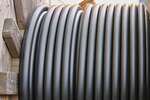05/10/2008
Thailand - First robot to cross the Atlantic using the power of wind
An unmanned automated boat, known as ” Pinta the robot”, is undergoing final preparations before setting sail in the hope of becoming the first robot to cross an ocean, namely the Atlantic , using the power of wind.
According to a report in The Times, Pinta has been designed by scientists at Aberystwyth University in UK , and will join seven other robotic craft in October in a race across the Atlantic .
The race is intended to test the endurance and reliability of robots away from battery chargers and the predictable environment of a laboratory.
The race across the Atlantic , which starts in October, pits Pinta against seven other robot craft from six countries.
By sailing non-stop and unassisted for an estimated three months, it will prove the potential for robotic craft to undertake vital research in roles in dangerous and far-off waters.
The boat is a smaller, cheaper version of a more elaborate robot sailing boat, Beagle B, and is being used to prove that the onboard technology works.
The boat uses solar panels to provide the power to operate a robot arm on the tiller and a pulley system to change the angle of the sail. Solar panels would provide too little power to run an engine and batteries would run out in days or hours.
According to Mark Neal, of Aberystwyth University , “This is the first time anybody has attempted to sail across any ocean with an automated boat. The big issue in robotics at the moment is longevity and flexibility in a complicated environment.”
“Something that can survive for two to three months completely unassisted while doing something interesting is a major challenge. If it does get there, I will be seriously cheerful. It will open up all the oceans to environmental monitoring by robots,” he added.
A robotic sailing boat able to find its own way around the seas would be able to undertake sampling expeditions to collect data for scientists studying, among other topics, climate change, weather and the chemistry of the oceans.
Sensors would be able to measure the carbon dioxide content of the water, chlorophyl content, pollution, air pressure, air and sea temperatures, and wind speed.
The data gathered would provide invaluable information to scientists, and events such as plankton blooms and oil spills could be tracked by the robots to monitor their progress.
Scientists are able to gather such information already but the robots would offer a much cheaper and more flexible option. Because no one is on board, it would be easier to operate them in dangerous conditions. (ANI)
According to a report in The Times, Pinta has been designed by scientists at Aberystwyth University in UK , and will join seven other robotic craft in October in a race across the Atlantic .
The race is intended to test the endurance and reliability of robots away from battery chargers and the predictable environment of a laboratory.
The race across the Atlantic , which starts in October, pits Pinta against seven other robot craft from six countries.
By sailing non-stop and unassisted for an estimated three months, it will prove the potential for robotic craft to undertake vital research in roles in dangerous and far-off waters.
The boat is a smaller, cheaper version of a more elaborate robot sailing boat, Beagle B, and is being used to prove that the onboard technology works.
The boat uses solar panels to provide the power to operate a robot arm on the tiller and a pulley system to change the angle of the sail. Solar panels would provide too little power to run an engine and batteries would run out in days or hours.
According to Mark Neal, of Aberystwyth University , “This is the first time anybody has attempted to sail across any ocean with an automated boat. The big issue in robotics at the moment is longevity and flexibility in a complicated environment.”
“Something that can survive for two to three months completely unassisted while doing something interesting is a major challenge. If it does get there, I will be seriously cheerful. It will open up all the oceans to environmental monitoring by robots,” he added.
A robotic sailing boat able to find its own way around the seas would be able to undertake sampling expeditions to collect data for scientists studying, among other topics, climate change, weather and the chemistry of the oceans.
Sensors would be able to measure the carbon dioxide content of the water, chlorophyl content, pollution, air pressure, air and sea temperatures, and wind speed.
The data gathered would provide invaluable information to scientists, and events such as plankton blooms and oil spills could be tracked by the robots to monitor their progress.
Scientists are able to gather such information already but the robots would offer a much cheaper and more flexible option. Because no one is on board, it would be easier to operate them in dangerous conditions. (ANI)
- Source:
- Online editorial www.windfair.net
- Author:
- Edited by Trevor Sievert, Online Editorial Journalist
- Email:
- press@windfair.net
- Link:
- www.windfair.net/...
- Keywords:
- wind energy, renewable energy, wind turbine, wind power, wind farm, rotorblade, onshore, offshore


























